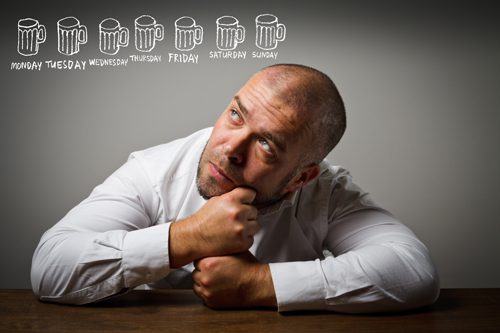 When it comes to drinking alcohol, people typically fall into one of two categories: low-risk or high-risk.
When it comes to drinking alcohol, people typically fall into one of two categories: low-risk or high-risk.
Individuals who are at a low risk of becoming addicted to alcohol may drink socially or only have a drink a couple of times a year, on special occasions. They are easily able to limit the number of alcoholic beverages they consume on any given day without effort. These limits look like no more than three drinks on any single day and no more than seven drinks per week for women, and no more than four drinks on any single day and no more than 14 drinks per week for men. NIAAA research shows that only about 2 in 100 people who drink within these limits have an alcohol use disorder.
Now let’s take a look at what is considered a heavy or high-risk drinker.
Heavy drinkers tend to drink both more often and higher quantities of alcohol than someone who falls into the low-risk category. Heavy drinkers frequently binge drink, causing rapid spikes in their blood alcohol content and extreme intoxication. Individuals with heavy drinking tendencies will also find themselves suffering consequences that stem from overindulging such as car accidents, health issues, and personal relationship difficulties. Heavy drinkers are some of the most at risk for becoming physically dependent on alcohol and end up with alcoholism. Substance Abuse and Mental Health Services Administration answers the question “what is considered a heavy drinker?” with limits, similar to those used in identifying low-risk drinkers. Heavy drinking is defined as drinking five or more drinks on the same occasion on each of five or more days in the past 30 days.
Not all heavy drinkers transition into full-scale alcoholism, but heavy drinking is most definitely a serious risk factor.
It is much easier for a heavy drinker to quickly shift into alcoholism when life takes a difficult turn. Life changes that cause stress, such as loss of a job, divorce/breakup, or a family death can lead a person to cross over into dangerous territory with their drinking.
If you are worried that you or a loved one have become what is considered a heavy drinker, don’t wait to reach out for help. You are not alone, and help is usually a phone call away.

Reference
Drinking Levels Defined | National Institute on Alcohol Abuse and Alcoholism (NIAAA). (n.d.). Retrieved December 2016.


 When it comes to drinking alcohol, people typically fall into one of two categories: low-risk or high-risk.
When it comes to drinking alcohol, people typically fall into one of two categories: low-risk or high-risk.